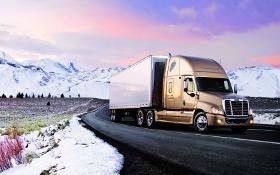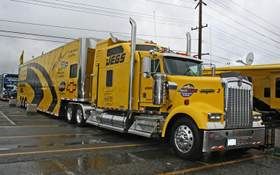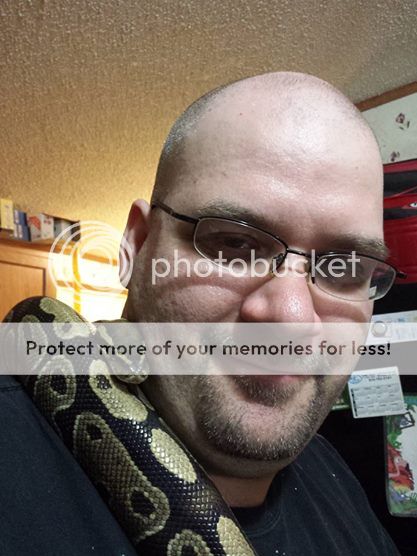Question About High Road Training
Topic 5819 | Page 1

So im down to about six days left before I head off fro Prime training and ive got a quick question.
Ive been using the high road for my studying (i feel as if my skull is gonna pop lol) and of course its broken down into a lot more detailed sections, but i was wondering, what sections relate to the sections most needed to study to pass the written exam?
For example, its my understanding i need to know General Knowledge, Combination, Air brakes, and Tanker for testing at Prime.
On High Road i have currently completed: Rules and Regs, Driving Safely, Transporting Cargo Safely, Air Brakes, Combination, and Tankers.
What other sections would I "most surely" see on the permit exam, and what others would learn more once im there and "doing" (such as pre-trip, though i have been going over it anyway)
I just want to be sure ive at least covered what i will see in my early exam and cover the rest as i go.
Thanks!
General knowledge, air brake & combination are the 3 needed in Minnesota ( and I would think everywhere) - these are required to drive a tractor trailer combination.......... tankers, double triples, hazmat are all extra tests for those additional endorsements
HAZMAT:
Hazardous Materials
Explosive, flammable, poisonous or otherwise potentially dangerous cargo. Large amounts of especially hazardous cargo are required to be placarded under HAZMAT regulations
HOS:
Hours Of Service
HOS refers to the logbook hours of service regulations.
Hey Will...here's a breakdown of our High Road Training Program:
To Get Your CDL Permit:
~ Rules & Regulations
~ Driving Safely
~ Transporting Cargo Safely
~ Air Brakes
~ Combination Vehicles
~ Pre-Trip Inspection
~ Driving Exam
To get your CDL endorsements which are optional but we highly recommend you get:
~ Tankers
~ Transporting Passengers
~ Doubles And Triples
~ Hazardous Materials
And two sections we've built ourselves with info you'll need for everyday life on the road but the manual doesn't really cover it:
~ Logbook
~ Weight & Balance
Pre-trip Inspection:
A pre-trip inspection is a thorough inspection of the truck completed before driving for the first time each day.
Federal and state laws require that drivers inspect their vehicles. Federal and state inspectors also may inspect your vehicles. If they judge a vehicle to be unsafe, they will put it “out of service” until it is repaired.
CDL:
Commercial Driver's License (CDL)
A CDL is required to drive any of the following vehicles:
- Any combination of vehicles with a gross combined weight rating (GCWR) of 26,001 or more pounds, providing the gross vehicle weight rating (GVWR) of the vehicle being towed is in excess of 10,000 pounds.
- Any single vehicle with a GVWR of 26,001 or more pounds, or any such vehicle towing another not in excess of 10,000 pounds.
- Any vehicle, regardless of size, designed to transport 16 or more persons, including the driver.
- Any vehicle required by federal regulations to be placarded while transporting hazardous materials.
Logbook:
A written or electronic record of a driver's duty status which must be maintained at all times. The driver records the amount of time spent driving, on-duty not driving, in the sleeper berth, or off duty. The enforcement of the Hours Of Service Rules (HOS) are based upon the entries put in a driver's logbook.
Combination Vehicle:
A vehicle with two separate parts - the power unit (tractor) and the trailer. Tractor-trailers are considered combination vehicles.
Doubles:
Refers to pulling two trailers at the same time, otherwise known as "pups" or "pup trailers" because they're only about 28 feet long. However there are some states that allow doubles that are each 48 feet in length.

Hey Will...here's a breakdown of our High Road Training Program:
To Get Your CDL Permit:
~ Rules & Regulations
~ Driving Safely
~ Transporting Cargo Safely
~ Air Brakes
~ Combination Vehicles
~ Pre-Trip Inspection
~ Driving Exam
To get your CDL endorsements which are optional but we highly recommend you get:
~ Tankers
~ Transporting Passengers
~ Doubles And Triples
~ Hazardous Materials
And two sections we've built ourselves with info you'll need for everyday life on the road but the manual doesn't really cover it:
~ Logbook
~ Weight & Balance
Exactly what I was wanting to know! Thanks a lot Anchorman!
Pre-trip Inspection:
A pre-trip inspection is a thorough inspection of the truck completed before driving for the first time each day.
Federal and state laws require that drivers inspect their vehicles. Federal and state inspectors also may inspect your vehicles. If they judge a vehicle to be unsafe, they will put it “out of service” until it is repaired.
CDL:
Commercial Driver's License (CDL)
A CDL is required to drive any of the following vehicles:
- Any combination of vehicles with a gross combined weight rating (GCWR) of 26,001 or more pounds, providing the gross vehicle weight rating (GVWR) of the vehicle being towed is in excess of 10,000 pounds.
- Any single vehicle with a GVWR of 26,001 or more pounds, or any such vehicle towing another not in excess of 10,000 pounds.
- Any vehicle, regardless of size, designed to transport 16 or more persons, including the driver.
- Any vehicle required by federal regulations to be placarded while transporting hazardous materials.
Logbook:
A written or electronic record of a driver's duty status which must be maintained at all times. The driver records the amount of time spent driving, on-duty not driving, in the sleeper berth, or off duty. The enforcement of the Hours Of Service Rules (HOS) are based upon the entries put in a driver's logbook.
Combination Vehicle:
A vehicle with two separate parts - the power unit (tractor) and the trailer. Tractor-trailers are considered combination vehicles.
Doubles:
Refers to pulling two trailers at the same time, otherwise known as "pups" or "pup trailers" because they're only about 28 feet long. However there are some states that allow doubles that are each 48 feet in length.
New Reply:
New! Check out our help videos for a better understanding of our forum features

















Preview:








 TT On Facebook
TT On Facebook
So im down to about six days left before I head off fro Prime training and ive got a quick question.
Ive been using the high road for my studying (i feel as if my skull is gonna pop lol) and of course its broken down into a lot more detailed sections, but i was wondering, what sections relate to the sections most needed to study to pass the written exam?
For example, its my understanding i need to know General Knowledge, Combination, Air brakes, and Tanker for testing at Prime.
On High Road i have currently completed: Rules and Regs, Driving Safely, Transporting Cargo Safely, Air Brakes, Combination, and Tankers.
What other sections would I "most surely" see on the permit exam, and what others would learn more once im there and "doing" (such as pre-trip, though i have been going over it anyway)
I just want to be sure ive at least covered what i will see in my early exam and cover the rest as i go.
Thanks!